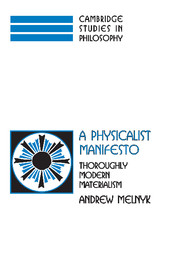Book contents
- Frontmatter
- Contents
- Preface
- Introduction
- 1 Realization Physicalism
- 2 But Why Not Supervenience?
- 3 Realizationism and R*d*ct**n*sm
- 4 Causation and Explanation in a Realizationist World
- 5 The Evidence against Realization Physicalism
- 6 The Evidence for Realization Physicalism
- References
- Index
- Titles in the series
6 - The Evidence for Realization Physicalism
Published online by Cambridge University Press: 02 September 2009
- Frontmatter
- Contents
- Preface
- Introduction
- 1 Realization Physicalism
- 2 But Why Not Supervenience?
- 3 Realizationism and R*d*ct**n*sm
- 4 Causation and Explanation in a Realizationist World
- 5 The Evidence against Realization Physicalism
- 6 The Evidence for Realization Physicalism
- References
- Index
- Titles in the series
Summary
INTRODUCTION
The aim of this chapter is to argue that there is indeed empirical evidence in favor of realization physicalism. This evidence is evidence in the sense that it raises the probability of realization physicalism, although I do not attempt a precise estimate of how high it raises this probability. The availability of such evidence, I claim, is a consequence of certain scientific findings that are neither recondite nor especially controversial. Indeed, they may be found in standard textbooks in such fields as condensed matter physics, physical chemistry, and molecular biology. But the fact that a scientific finding is relatively uncontroversial does not imply that its evidential relevance to some particular hypothesis will likewise be uncontroversial. For the evidential relevance of an uncontested claim can be overlooked: Sherlock Holmes's stock-in-trade, after all, was not merely to notice facts that others had missed but also to expose the hitherto unnoticed evidential relevance of facts already known to everyone (e.g., the fact that the dog did not bark in the night). Accordingly, I conceive my task in this chapter as that of exposing the evidential relevance to realization physicalism of certain well-known scientific findings.
The relevance of the scientific findings I have in mind consists in their enabling the deployment of a certain complex strategy of nondeductive reasoning in favor of realization physicalism. This strategy involves the combined use of three tactics.
- Type
- Chapter
- Information
- A Physicalist ManifestoThoroughly Modern Materialism, pp. 238 - 310Publisher: Cambridge University PressPrint publication year: 2003



